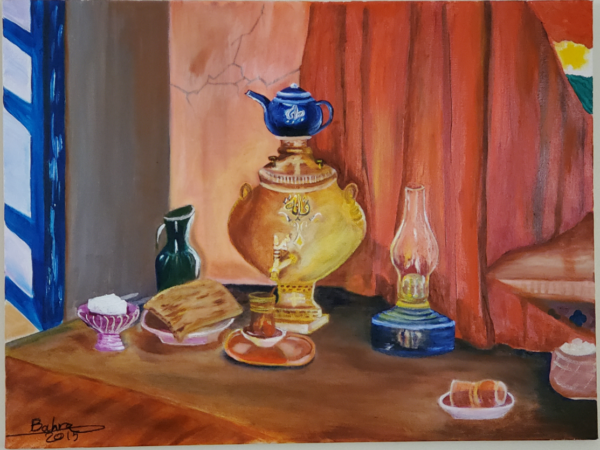Virtual Porch Chats 2020!

What are Porch Chats?
Porch chats are an opportunity for the community to come together and have conversations about what’s happening in our community. They are to promote understanding, build community connections and facilitate action among citizens and communities. Porch Chats are part or the Friends of Crime Prevention initiative and chat ideas are brought forth my members of our community. Some porch chats have been recorded and can be found below.
Brought to you by the Friends of Crime Prevention, All 2020 Porch Chats are part of the #KeepFamiliesSafe Campaign. #KeepFamiliesSafe is rooted in raising awareness of family, friends, neighbours and people in the work place about family violence especially under the strain and isolation of the pandemic. It encourages community to pay attention and equips them with ways they can help.
Usually Porch chats are held on the porch and surrounding gardens of the historic Governor’s house, home of the Waterloo Region Crime Prevention Council at 73 Queen St. N. in Kitchener. But, adapting to Covid-19, we will meet on a virtual porch. BYOL (Bring your Own Lemonade) See you there!
We have had four Porch Chats on Prevention Family Violence over summer all delivered in English. With the help of generous community members we have been able to offer Porch Chats in languages other than English. If you would like a Porch Chat facilitated in your language please contact Julie Thompson.
Upcoming Porch Chats :
Impact of Migration on Families and the added Risks During Covid 19
Recognizing that family violence takes place in all cultures, we have worked with the #KFS coalition partners to extend the conversation into languages other than English. Lucky to meet Asmaa Cober, she helped coordinate four of these Porch Chats, in four different languages starting with those she spoke. These are the first Porch Chats facilitated in languages other than English. We hope to extend the conversation into others of the rich and diverse communities that make up Waterloo region.
In this porch chat, we will build understanding how family relationships, mental health, and stress levels change after arrival to a new home and how is that connected to Covid 19 situation. We will have a dialogue about cross generational and cross cultural conflict that can lead to family violence. We will present signs of abusive relationships and discuss what we can do as community members in helping families stay safely together. We will explore some tips to help adults and children to use conflict resolution skills to solve problems. We will elaborate on some services that are available to help families improve relationships and maintain family peace. Our main goal help communities come together to keep families together and safe.
We are a coalition of 18 organizations concerned about the impact of the Pandemic on families. Like the increased stress and isolation of the pandemic, family strain is universal and we need each other now more than ever. Please help us get the word out.
In Farsi : عنوان این گفتوگو «تأثیر مهاجرت بر روابط خانوادگی» است
در این گفتوگو، ما به چگونگی تغییر روابط خانوادگی، بهداشت روان و بالارفتن سطح استرس پس از ورود به خانهٔ جدید (کشور میزبان) و نیز ارتباط آن با وضعیت همهگیری بیماری کووید ۱۹ (کرونا) خواهیم پرداخت.
همچنین ما درمورد درگیریهای بیننسلی و میانفرهنگی گفتوگو خواهیم کرد؛ عواملی که هر یک یا با هم میتواند به بروز ناآرامی و خشونت در خانواده منجر شود.
ما نشانههایی از روابط خشن یا دارای آزار را ارائه خواهیم داد و سپس درمورد آنچه میتوانیم بهعنوان اعضای جامعه انجام دهیم تا کمک کند خانوادهها در امنیت و آرامش کنار یکدیگر زندگی کنند به بحث خواهیم پرداخت.
نکات ما، برخی راههای برای کمک به هر دو گروه بزرگسالان و کودکان در استفاده از مهارتهای حل تعارض را در برمیگیرد و همچنین در مورد برخی خدماتِ روانشناختی و اجتماعیٍ دردسترس که برای کمک به خانوادهها در بهبود روابط و حفظ آرامش توضیح خواهیم داد. هدف اصلی ما حفظ خانوادهها در کنار یکدیگر در محیطی امن و آرام است.
Monday, November 30, 2020: Register Here
In Arabic : تاثير الغربة على العلاقات العائلية
خلال الجلسة سوف نركز على النقاط التالية : التاثيرات والتغييرات في العلاقات العائلية والصحة النفسية بعد الهجرة الى مكان جديد، وارتباطها بوباء الكورونا. سوف نناقش الازمات المتعلقة بالاجيال والثقافات المختلفة والتي قد تؤدي الى عنف ضمن الاسرة. أيضا، سوف نتكلم عن مؤشرات العلاقات الغير صحية أو المسيئة وماذا نستطيع ان نفعله كاعضاء في مجتمعنا لمساعدة العائلات، لكي يشعروا بالامان مع بعضهم البعض. سنتطرق ايضا الى بعض المفاتيح الاساسية لمساعدة الاولاد والكبار بتطوير مهارات حل النزاعات. كما سنتكلم عن الخدمات المتواجدة لمساعدة العائلات بتحسين العلاقات فيما بينهم والمحافظة على السلام والسكينة. هدفنا الاساسي هو المحافظة على وحدة وسلامة الاسرة.
Dec 2; Register Here
In Turkish : Göçün Aile İlişkilerine Etkisi
Yeni bir yaşama başladığımız bu yeni ülkede, aile ilişkilerinin, akıl ve ruh sağlığının, ve kişisel stres seviyelerinin nasıl değiştiğini ve COVID19’un bu değişimdeki etkisini konuşacağımız bu sohbette, aile içi şiddete yol açabilen, nesiller ve kültürler arası çatışmalarla ilgili diyaloglar da kuracağız.
Kötüye kullanılan, suistimal edilen ilişkilerin izlerini sürecek, toplum olarak ailelerin nasıl bir arada huzur içinde ve güvende yaşamasını destekleyebileceğimizi ele alacağız.
Yetişkinlerin ve çocukların fikir ayrılıklarını nasıl çözebilecekleri ile ilgili bazı ipuçları paylaşacağız. Ailelerin ilişkilerini iyileştirmelerine ve aile huzurunu sürdürmelerine yardımcı olmak için mevcut olan bazı hizmetlerin üzerinde duracağız.
Bu sohbetteki ana hedefimiz ailelerin bir arada ve güvende olması için ne yapmamız gerektiğini bilmek, gerekeni yapmak ve iyileştirici adımlar atılmasını sağlamaktır.
Dec 8 Register Here
In Kurdish (Sorani and Badini): ‘ئه م دئ جاوه دانوستاندينئ دگه ل خو و خيزان و زاروكين خو كه ين’
ئه ف بابه ته دئ ل سه ر وئ جه ندئ بيت ئه م دئ جا وه خو و خيزانا خو دير كه ين ژ نه ئارام بونا ميشيكي و هزرا و هه ر نه ئارام بونه كي ده مئ دهيه وه لاته كئ ني و تايبه ت في وه ختئ ئه م هه مي تيدا دژين يئ كورونايئ دا (COVID 19)و هه روه ها دئ جاوه خو و خيزانا خو ژ في فايروسي پاريزين.و دئ جاوه كه لتوري خو كونجيني دگه ل كه لتوريت دي و سه ره ده ريئ و هاريكاري دگه ل ئيك كه ين دا پيكفه ده ستيت خو بكه ين ئيك بو ئارام بون ژ لايه نئ ميشكي ڤه و دلا.
Tuesday, Dec 15: Register Here
More Porch Chats may be announced.
Some of our past Porch Chats have been recorded and posted below.
Past Porch Chats 2020:
Understanding Emotional Abuse and Precursors to Violence in the Home – Link to recording below
- Click here to view recording: shorter 105 Mins
- Click here to view recording: longer 118 Mins (includes detailed description of Women’s Crisis Service)
Understanding the Impact of Trauma and Abuse on Children Aug 12:
Resolving Conflict in Families – Aug 19
Becoming An Active Bystander Registration – Click here to view recording. Aug 24, 2020
Stay Tuned!
Click here to visit our Events Calendar for more details.
Hats off to this amazing coalition!
- Community Justice Initiatives – The Just Community
- City of Kitchener
- City of Waterloo
- Region of Waterloo
- Family & Children’s Services of the Waterloo Region
- Child Witness Centre
- Lutherwood Children’s Mental Health
- Wilmot Family Resource Centre Inc.
- Women’s Crisis Services of Waterloo Region
- Waterloo Region Immigration Partnership
- Kitchener Waterloo Multicultural Centre – KWMC


 Author: Sue Klassen is completing her Masters in Conflict Transformation, with concentrations in Restorative Justice and Trauma Healing. As past president of Partners in Restorative Initiatives, a restorative justice agency in Rochester, NY, she has 12 years experience in working with restorative justice and trauma in courts, schools and the community, as a facilitator, trainer and advocate.
Author: Sue Klassen is completing her Masters in Conflict Transformation, with concentrations in Restorative Justice and Trauma Healing. As past president of Partners in Restorative Initiatives, a restorative justice agency in Rochester, NY, she has 12 years experience in working with restorative justice and trauma in courts, schools and the community, as a facilitator, trainer and advocate.